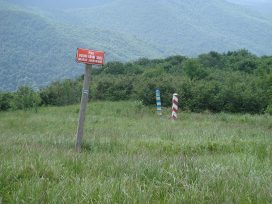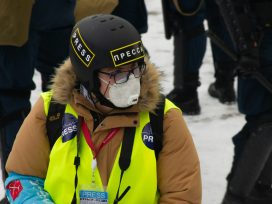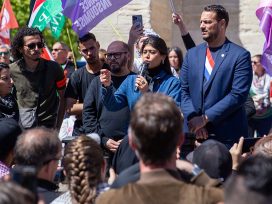The international organizations International Press Institute and Reporters without Borders are deeply concerned about the state of the Slovenian media. In September and October 2007 they made dramatic appeals to Prime Minister Janez Jansa and his government, requesting that a special independent commission be established to investigate political pressures on the media. Disappointingly, the prime minister failed to respond. This was not entirely unexpected by the institute, which warned in a second letter that should the prime minister continue to ignore their request, they would send their own representatives to investigate and report on the situation at the beginning of 2008, when Slovenia assumes the presidency of the European Union. This would be a major stain on the international reputation of the country.
Very few citizens know of these demands by international organizations. This is because the news was largely suppressed in the Slovenian media, which just goes to confirm the general criticisms regarding political control of the media and censorship, about which we also wrote in a recent 140-page thematic issue of Dialogi. And so the story about censorship was itself censored. But the larger story about curtailing freedom of the press in Slovenia is not news: it has been playing out for at least two years now. The suspension of journalists, the political demands on editors, the publishing of uncritical, pro-government reports, the blackmail of reporters and violations of the law – all these and more have been noted by the national journalists’ professional association and trade union as well as by numerous media analysts. Over the last two years the International Federation of Journalists has also issued protests over unacceptable changes in media legislation and the political pressures on journalists. A journalist at the daily newspaper Vecher, Blaz Zgaga, appealed to European leaders and citizens to help stop the pressures on journalists from Prime Minister Jansa. In September 2007, Zgaga and his colleague Matej Surc began gathering signatures from other journalists on a petition protesting the government’s restriction of media freedom. It was signed by 571 journalists, or about a quarter of all working journalists in Slovenia. A large number, but not enough to cause the prime minister to acknowledge them or their demands and publicly address the issue. And this in spite of the fact that the petition, which was also sent abroad, has been reported on by about 120 different media organizations in Europe, and prompted numerous letters of solidarity from other European national journalists’ associations.
Although the testimony of the journalists is clear and the story transparent, unfortunately they have not entirely succeeded in convincing the broader public. We have already mentioned one of the reasons for this: members of the pro-government media will not report on the assumption of media control by those who helped them acquire their own positions. In this way, obviously, members of the public are deprived of important information on the basis of which they could build up their knowledge of the situation. Let us remember that, according to the International Federation of Journalists, the following media outlets are government-controlled: Radiotelevizija Slovenija (which has radio and television broadcasts) and the daily newspapers Primorske novice, Delo and Vecher. The weekly magazines Mag and Demokracija also undeniably belong in this camp. These media organizations have a convincingly dominant role in the cross-section of media influences in the country.
The next reason for the passivity of citizens is rooted in the strategies for neutralizing criticisms of the pressures. One of them, which has been used among journalists themselves, is that the petition is politically motivated, which is an outright lie. Journalists who support the government thus created a counter-petition and gathered 30 signatures. No international professional organization has taken up their cause and no one has reported on it in the foreign media. Nor would one expect them to, given the maneuver’s obvious intent to mislead. An interesting interpretive position is being offered up through the explanation by ruling politicians and pro-regime journalists regarding the political motivations of those who are making supposedly unjust accusations of pressure and censorship. Namely, they generally do not refer to any alleged connection with opposition politicians, but rather to “the journalists’ historic leftism”. When Mr. Jansa’s party came to power in 2004, Slovenia faced multi-year rule by right-wing parties for the first time in its history. Thus for the representatives making up the ruling coalition, practically all journalists who are not “theirs” are leftists. This is of course a baseless criticism, and the division between “ours” and “yours” an invention. Due to these ideological assumptions, the government even began changing laws regulating the media, with the idea of introducing some sort of “balance” and pluralizing the media, which in their view was too left-leaning, and began financially supporting those were loyal to them. But this is not the worst: the government also decided to introduce its own new criteria of truth. The logic of balancing truth goes like this: whoever says that “A” is true has only provided part of the truth, because it is always possible to say “not-A”. You can also always find a particular counter-truth, as a result of which we must at some level accept that both are equally valid and we must financially support both. This is supposed to be a sign of media democracy according to the measures of balance and plurality. It is probably unnecessary to explain how bizarrely stupid this kind of thinking is and what kind of chaos in our system of values and epistemology it leads to.
There is a third reason for the passivity among citizens, who console themselves with the thought that “it’s still not that bad,” as a result of which the in fact acute situation has not yet moved larger masses. Although the appeals of foreign institutions are striking, and the number 571 protesting journalists fascinatingly high, nevertheless many a journalist from the ranks decided not to support the petition. Pro-government journalists had good reason not to sign. But what about the others? Most likely they are worried about their jobs and their families, and so they prefer to stay silent. Some of them may hope for advancement, others may believe that truth is relative, in the way described above. Some have succeeded in convincing themselves that they never served the regime in power, that they are merely good journalists who must give each government a chance and mustn’t be excessively critical. Furthermore, the Slovenian market is small, and losing one’s job as a journalist means taking up some other occupation. This is extremely difficult. Still others take comfort in the hope that Jansa may lose in 2008 and things will be better if and when he does. Each of these responses is only human and thus understandable. However, that does not make it excusable.
News about the state of the Slovenian media is thus not encouraging. In this sense the communications theorist Marshall McLuhan was right when he said, “Real news is bad news.” The news above is both real and bad, and moreover it impacts the fate of news journalists themselves.






